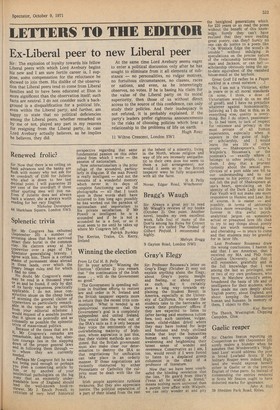Gray's Elegy
Sir: Professor Rousseau's letter on Gray's Elegy (October 2) may not explain anything about the Elegy, about Gray's poetic insight and feeling, or about poetry as such. But it certainly goes a long way towards explaining the Student Revolt in America, especially at the University of California. No wonder the students take to the barricades or wreck their professors' offices if they are expected to listen to (after having paid enormous tuition fees, too) such tasteless, vulgar, inane, cliché-ridden drivel where they may have looked for large and humane and truly civilised minds that kept the humanities human and were capable of awakening and heightening their latent sense of wonder and reverence. Conservative as I am, I too, would revolt if I were forced to listen to a displaced gossip columnist in the chair of a professor of literature.
Now that we have been vouchsafed the blinding revelation that the line, " He gain'd from Heav'n ('twas all he wish'd) a friend," means nothing more universal than a purple love affair with Walpole, we can only wonder at and pity the benighted generations which for 220 years or so read the poem without the benefit of this knowledge. Surely they can't have realised that they were reading great poetry, can they? Surely no one can do justice to a poem like " On Wenlock Edge the wood's in trouble" without indulging in speculations on the precise nature of the relationship between Housman and Jackson, or can he? — scholarship obviously being the upto-date equivalent of the vanished house-maid at the keyhole.
Great God! I'd rather be a Pagan suckled in a creed outworn . .! No, I am not a Victorian, either in years or in all moral standards (in some, I think, a dose of Victorianism would do us no end of good!), and I have no prejudice whatever against homosexuality, believing as I do that in this, as in everything else, quality is everything. But I do object, passionately, to bad taste, to lack of respect for reticence and privacy in the most private of all human experiences, especially when it appears in the guise of higher scholarship, and I would leave the sex life of other people — Shakespeare's, Gray's, Walpole's, Housman's, or the postman's — exactly where it belongs: to other people, i.e., to them. I deny that a prurient curiosity about the sexual proclivities of a poet adds one bit to our understanding and to our response to his poetry; if one has not felt the pull of Shakespeare at one's heart, speculating on the identity of the Dark Lady and the Fair Youth will not make one more responsive to Hamlet and Lear. But of course, it is easier — and possibly, in terms of university politics more rewarding — to talk forever in this awful psychanalytical jargon on someone's actual or presumed love life than to try to say things about poetry that are worth remembering — and cherishing — in years to come and that students may be grateful for in later life.
Lest Professor Rousseau draw the wrong conclusions, I hasten to add that I am American, that I received my MA and PhD from Columbia University, and that I still remember, gratefully and in the full knowledge that I was among the last so privileged, one or two of my own professors, who have, in Matthew Arnold's sense, broadened the basis of life and of intelligence for their students, who have made me care deeply about English poetry, about England, and about keeping the humanities human and humane. In memory of them, I object to this.
Kay Heriot The Thatch, Westington, Chipping Campden, Glos.










































 Previous page
Previous page